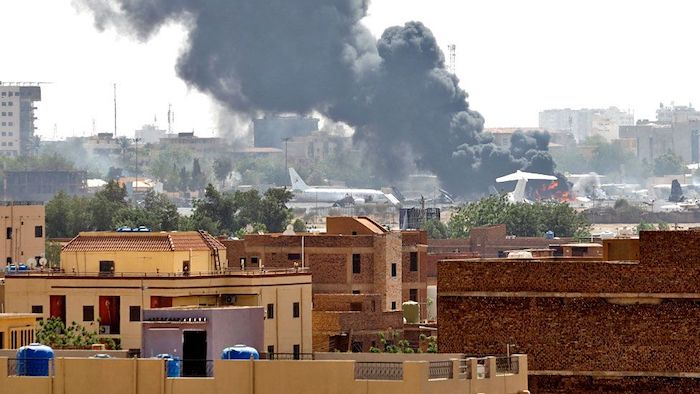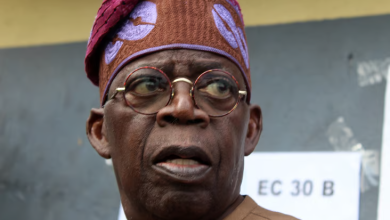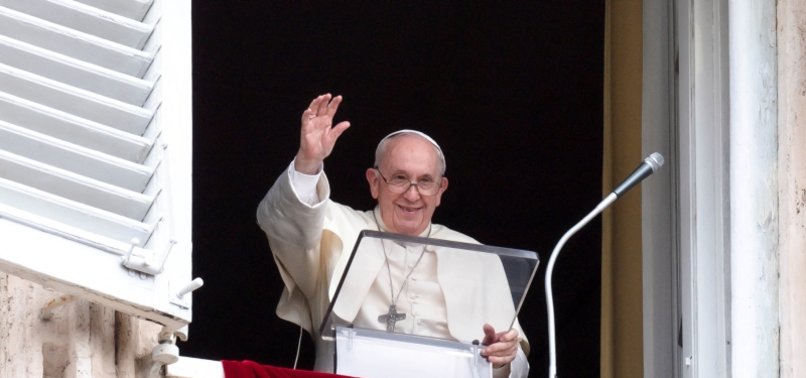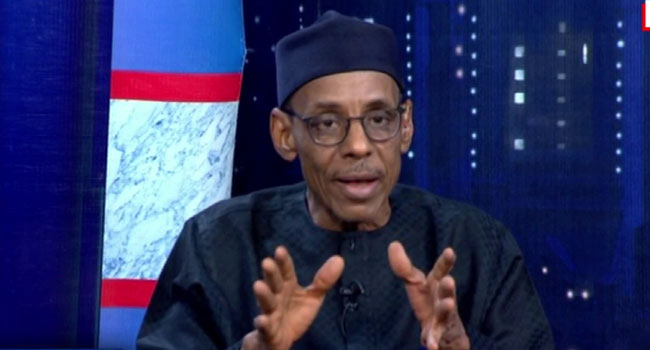Airstrikes hit Khartoum as Sudan ceasefire falters

Airstrikes and artillery reportedly rocked Khartoum on Saturday as Sudan entered a third week of fighting between rival military forces despite a ceasefire, prompting more civilians to flee and renewed warnings of wider instability if the war is not stopped.
As dark smoke rose over Khartoum, a U.N. envoy offered a possible flicker of hope, saying the warring sides who have so far shown no sign of compromise were now more open to negotiations – though no date had been set.

Hundreds of people have been killed and thousands wounded since April 15 when a long-simmering power struggle between Sudanese army and the paramilitary Rapid Support Forces (RSF) erupted into conflict.
Despite shelling early in the morning, residents of Khartoum and its neighbouring cities said the fighting had been less intense on Saturday than in recent days.
The fighting has pitched Sudan towards a civil war that has derailed an internationally-backed transition toward democratic elections and could destabilise a volatile region.
The sides have continued to battle it out during a series of ceasefires mediated by foreign powers, notably the United States. The latest 72-hour truce expires at midnight on Sunday.
On Saturday, the RSF accused the army of violating the ceasefire in areas under its control.
There was no immediate comment from the army, which has previously blamed the RSF for violations and which said on Saturday its forces were continuing to work to end “the rebellion”.
The prospects of negotiations between the leaders of the two sides have so far seemed bleak.
On Friday, army leader General Abdel Fattah al-Burhan said he would never sit down with the RSF’s “rebel” leader, referring to General Mohamed Hamdan Dagalo, who is more commonly known as Hemedti. The RSF chief in turn said he would talk only after the army ceased hostilities.
Nonetheless, the U.N. special representative in Sudan, Volker Perthes, told Reuters he had recently sensed a change in the sides’ attitudes and they were more open to negotiations.
“The word ‘negotiations’ or ‘talks’ was not there in their discourse in the first week or so,” Perthes said.
Perthes said the sides had nominated representatives for talks which had been suggested for Jeddah, Saudi Arabia, or Juba in South Sudan, though he said there was a practical question over whether they could get there to “actually sit together”.
The immediate task, Perthes said, was to develop a monitoring mechanism for ceasefires.
Perthes noted that he had told the Security Council both sides thought they could win the conflict, but he also said attitudes were changing. While the sides had made statements that the other side had to “surrender or die,” Perthes said, they were also saying, “ok we accept … some form of talks”.
“They have both accepted that this war cannot continue.”
At least 528 people have been killed and 4,599 wounded, the Sudanese health ministry told Al Jazeera, slightly more than a tally by the United Nations, which believes the real toll is much higher. The United Nations said more than 75,000 people had been internally displaced by the fighting.
Former Sudanese Prime Minister Abdalla Hamdok, speaking at a conference in Nairobi, said the war must stop, warning of its ramifications not just in Sudan but in the region.
“This is a huge country, very diverse … I think it will be a nightmare for the world,” he said.
“This is not a war between an army and small rebellion. It is almost like two armies – well trained and well armed.”
Tens of thousands of people have fled to neighbouring countries, while foreign governments have organised a major evacuation of expatriates. Saudi state broadcaster Alekhbaiya said that a passenger ship with 1,982 people on board from 17 countries will arrive at Jeddah port on Saturday, and almost 5,000 had already arrived.
Britain said its evacuations would end on Saturday as demand for spots on planes had declined.
Much of the fighting has played out in the capital Khartoum, where RSF fighters are embedded in residential areas and many residents are pinned down by urban warfare with scant water, food, fuel and power.
The fighting has also reawakened a two-decade-old conflict in the western Darfur region where scores have died this week.
Pregnant 23-year-old Zamzam Adam said she was was stranded, in labour, and alone as armed militias attacked and pillaged her village near the town of El Geneina in the western Darfur region and neighbours fled across the border into Chad.
“In our village, armed people came and burned and looted houses and we were forced to flee,” said Adam.
In Darfur, at least 96 people had died since Monday in inter-communal violence rekindled by the army-RSF conflict, said U.N. human rights office spokesperson Ravina Shamdasani.









